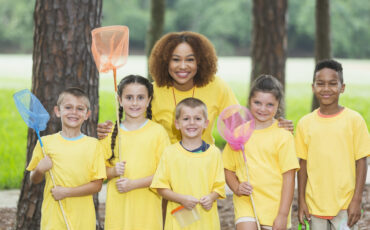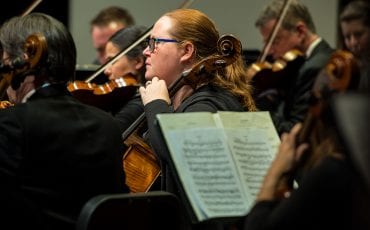Getting Ready for Overnight Camp: Tips for First-Timers

Camp Rockmont
Thinking of sending your kid to an overnight camp for the first time this summer? It can be overwhelming to try and figure out which one is the right fit, when to register, and how to prepare. Atlanta Parent spoke to campers, parents and directors about their advice on how to make the most of a first-time overnight camp experience.
Table of Contents
Before Camp
Use your resources
Take notes on what camps might be a good fit for your family by using Google, websites and Atlanta Parent.
Alyson Bennett Gondek, the Camp Director at Camp Woodmont, recommends starting with an online search. “Pare it down based on what you’re looking for – most first-time camper moms might be looking for smaller enrollment numbers. Look at the location of camp and see if the camp is accredited by the American Camp Association.”
“Taking a deep dive on the website is really important,” says Daniel Weatherby, the Assistant Director for Marketing for Camp Rockmont for Boys in North Carolina. Websites will have promotional videos, which will allow you and your child to get a feel for the camp and what it offers. Pay attention to dates and rates – availability and price range may help narrow down the camp options. If you’re worried about the affordability of camp, check to see if the camp offers scholarships.
Bethany Schuler learned of Camp Woodmont at an Atlanta Parent Camp Expo. “It seemed like a really great, family-run camp. He’s gone to the same session since he was 6,” she says. Aiden is now 15 years old.
Reflect on your own experience
Did you attend summer camp as a kid? What did you love? Thinking about why you enjoyed summer camp may help you narrow down the experience you want to give to your kids. Or maybe you want to send your kid to the same camp you attended?
Susan Malemezian’s sons have attended Camp Rockmont for four and seven years, respectively. In college, Malemezian was a camp counselor in North Carolina, and she had friends who were counselors at Camp Rockmont. When she and her husband were searching for camps, she was reminded of Camp Rockmont. “I wanted a camp where kids would be outside and where that was really valued. A place where they could explore away from home with great camp counselors who could talk to them about the things that are important in life and help develop their character.”
Talk to other families
“The No. 1 lead source where we find new families is by organic referrals,” Weatherby says. “Parents talking to other parents. You can also ask your son or daughter what camps friends are talking about at school.”
Talking to others is how Charlotte Ottley found out about Camp Woodmont. Her son, Will, has attended Camp Woodmont for eight years. “His best friend found it.” Ottley found out about the camp because of Schuler, and the next year, she sent Will. “They’re both going to be Leaders-In-Training this year.”
Ask questions
Camps are very responsive to questions or concerns. “We look at the relationship with the parent as a partnership, and we’re really available 12 months out of the year to have conversations. We welcome questions,” Weatherby says.
Include your child in discussions about camp and ask if they have any questions. “Kids have a deep sense of wonder and excitement. Lean into the curiosity of those questions,” Weatherby says.
Take the time to go on a tour
Camps may offer tours or open houses. With COVID-19, tours may be private or held virtually; check the website for guidelines.
Gondek recommends touring the camp in advance. “That way, parents and kids get to see the facility, see the grounds and meet staff. We have an open house in May and doing that in advance is really helpful.”
Prep kids for when they may feel anxious or homesick
Make sure kids know that it’s normal to feel homesick or unsure of things their first summer at camp. Tell them who they can turn to if they are feeling nervous or sad and give them other ways to cope like writing a letter home. “Every adult at camp is there to help you,” Weatherby says. “The counselor in their cabin will be their main adult point person, but every adult is there to help.”
If your child is extremely nervous, Malemezian recommends trying a camp with a starter session, which is shorter and will help the camper feel comfortable.

Camp Woodmont
Get campers excited about the experience
Talk to your kids beforehand about how they can make the most of camp. “The best part is making new friends and definitely the activities,” Will Ottley says. “I like going to the climbing walls. I was always afraid of heights, but I beat the fear after one year.” For first time campers, he recommends, “Be yourself, and bring certain things that remind you of home, so you’re not always alone, like stuffed animals or pictures.”
“There were so many things to do, and everyone is so nice,” Aiden Schuler says. “From the beginning, the counselors made it feel like a family, and it was nice to see them each year. Have a great attitude going in, so you can start having fun right from the beginning. There is always a friendly face and something to do, so don’t worry about being lonely or homesick!”
Make sure your kids have slept away from you
If your kids are very young, they may not have much experience being away from home. Practice what the camp experience may be like. “Have the child spend the night at grandma’s house or a neighbor’s house so that the child has had the experience of successfully being at someone else’s house for a night or two. Build up excitement by building a fort or tent to pretend that it’s camp, or build a bonfire outside and roast s’mores,” Gondek says.
Connect with staff
Most camp staffers are willing to work with you to create the best experience for your child. Learning more about the staff may help you decide if this camp is the right fit. “How long have they been with the camp? How are they screened? Many counselors at Camp Woodmont have grown up with me. I’ve known them since they were campers,” Gondek says.
“Reach out to staff ahead of time,” Malemezian says. “If your camp sends out ‘Tell Us About Your Son,’ be intentional about what you write on those sheets, such as the things they’re nervous about.”
During the Summer
Stay positive
The truth is that you may be more anxious than your child, and the adjustment period may be harder for you. “Most of the nervousness lies with the parent. At some point, you just have to go for it. As parents, we’re the ones that tend to worry. Once they get there, they’ll have fun,” Malemezian says. “If you write your kid at camp, stay upbeat – ‘We miss you, but we know you’re having a great time.’”
Embrace the benefits
One of these benefits of camp is kids learn to be independent. “If your kid is making warm connections and feeling confident, they will come home self-reliant,” Gondek says. “They’re comfortable when they get to camp, as it’s a level playing field. They will learn to be more self-confident and develop self-esteem.”
Malemezian seconds this notion. “I always see a lot of growth,” she says. “There’s something amazing about being somewhere without mom and dad and doing things on their own. They always flourish when they’re there.”
Some kids will love the people; some will love the activities; most will enjoy both! Thirteen-year-old Chase Malemezian chooses to be with different campers every year. “I like all the fun activities we get to do,” he says. “I like hanging out with the friends I make there.” He’s thinking of trying blacksmithing for the first time this summer.
This post was originally published in 2022 and has been updated.







